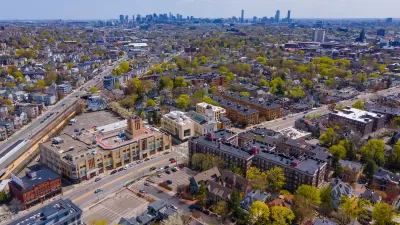In a city that survived the recession better than most, efforts to meet the demand for upscale housing will "change the face of the city for decades to come," reports Annys Shin.
According to Shin, the District's strong job market for young professionals, and a credit crunch that has made condominium conversion difficult, are putting immense pressure on the city's dwindling supply of affordable housing to undergo high-end makeovers. "As a result, low-cost rental housing is now disappearing at a faster rate than it was during the height of the housing boom, according to a new analysis of census data by the D.C. Fiscal Policy Institute...The Institute found that between 2000 and 2010, the city lost 50 percent of its low-cost rental housing. The rate of loss has accelerated since 2008, when the credit crunch began to slow condo conversions."
Writing in the City Paper, Lydia DePillis, asks whether the city's restrictive zoning, including its recently debated height limits, are a reason for the decline of housing affordability.
"It's true, affordable housing people were the driving force behind inclusionary zoning, and smart growth advocates are getting to agitate more forcefully for the city to require developers who want public land to incorporate affordable housing into their proposals. But many developers avoid the public land process altogether, preferring not to deal with all the delays and frustrations. And affordable housing shouldn't be all about setting prices artificially low-it's also about letting builders build the amount of housing this city needs."
FULL STORY: In D.C., low-cost apartments disappearing at rapid rate

Alabama: Trump Terminates Settlements for Black Communities Harmed By Raw Sewage
Trump deemed the landmark civil rights agreement “illegal DEI and environmental justice policy.”

Planetizen Federal Action Tracker
A weekly monitor of how Trump’s orders and actions are impacting planners and planning in America.

The 120 Year Old Tiny Home Villages That Sheltered San Francisco’s Earthquake Refugees
More than a century ago, San Francisco mobilized to house thousands of residents displaced by the 1906 earthquake. Could their strategy offer a model for the present?

In Both Crashes and Crime, Public Transportation is Far Safer than Driving
Contrary to popular assumptions, public transportation has far lower crash and crime rates than automobile travel. For safer communities, improve and encourage transit travel.

Report: Zoning Reforms Should Complement Nashville’s Ambitious Transit Plan
Without reform, restrictive zoning codes will limit the impact of the city’s planned transit expansion and could exclude some of the residents who depend on transit the most.

Judge Orders Release of Frozen IRA, IIJA Funding
The decision is a victory for environmental groups who charged that freezing funds for critical infrastructure and disaster response programs caused “real and irreparable harm” to communities.
Urban Design for Planners 1: Software Tools
This six-course series explores essential urban design concepts using open source software and equips planners with the tools they need to participate fully in the urban design process.
Planning for Universal Design
Learn the tools for implementing Universal Design in planning regulations.
Clanton & Associates, Inc.
Jessamine County Fiscal Court
Institute for Housing and Urban Development Studies (IHS)
City of Grandview
Harvard GSD Executive Education
Toledo-Lucas County Plan Commissions
Salt Lake City
NYU Wagner Graduate School of Public Service





























